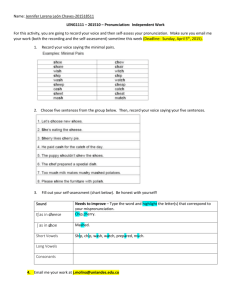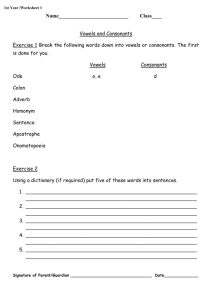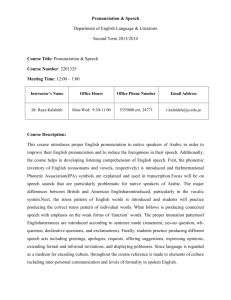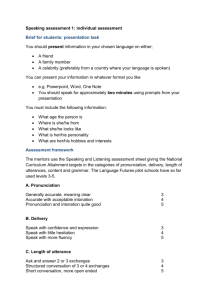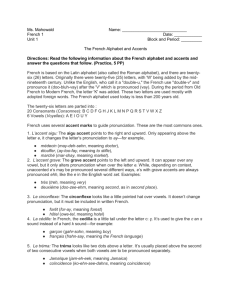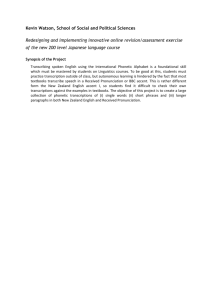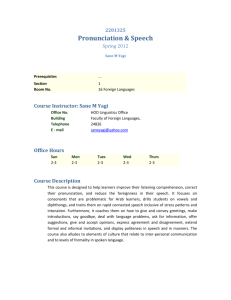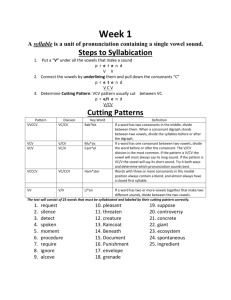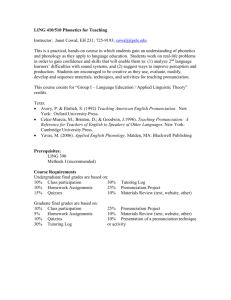Pronunciation and TESL - University of Florida
advertisement
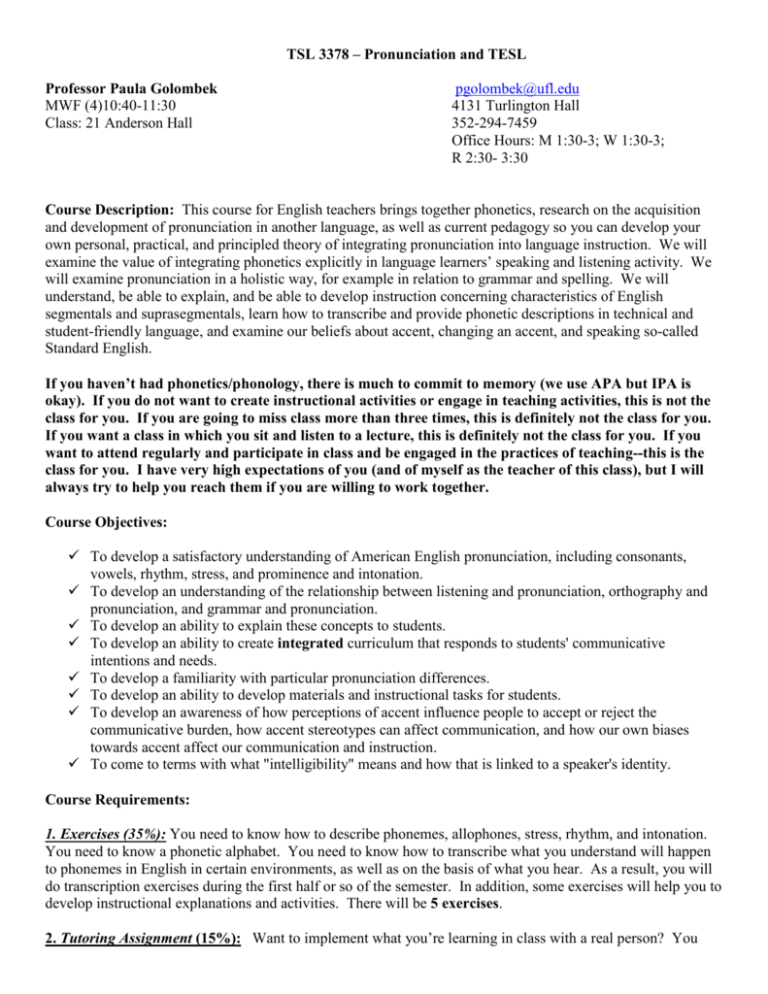
TSL 3378 – Pronunciation and TESL Professor Paula Golombek MWF (4)10:40-11:30 Class: 21 Anderson Hall pgolombek@ufl.edu 4131 Turlington Hall 352-294-7459 Office Hours: M 1:30-3; W 1:30-3; R 2:30- 3:30 Course Description: This course for English teachers brings together phonetics, research on the acquisition and development of pronunciation in another language, as well as current pedagogy so you can develop your own personal, practical, and principled theory of integrating pronunciation into language instruction. We will examine the value of integrating phonetics explicitly in language learners’ speaking and listening activity. We will examine pronunciation in a holistic way, for example in relation to grammar and spelling. We will understand, be able to explain, and be able to develop instruction concerning characteristics of English segmentals and suprasegmentals, learn how to transcribe and provide phonetic descriptions in technical and student-friendly language, and examine our beliefs about accent, changing an accent, and speaking so-called Standard English. If you haven’t had phonetics/phonology, there is much to commit to memory (we use APA but IPA is okay). If you do not want to create instructional activities or engage in teaching activities, this is not the class for you. If you are going to miss class more than three times, this is definitely not the class for you. If you want a class in which you sit and listen to a lecture, this is definitely not the class for you. If you want to attend regularly and participate in class and be engaged in the practices of teaching--this is the class for you. I have very high expectations of you (and of myself as the teacher of this class), but I will always try to help you reach them if you are willing to work together. Course Objectives: To develop a satisfactory understanding of American English pronunciation, including consonants, vowels, rhythm, stress, and prominence and intonation. To develop an understanding of the relationship between listening and pronunciation, orthography and pronunciation, and grammar and pronunciation. To develop an ability to explain these concepts to students. To develop an ability to create integrated curriculum that responds to students' communicative intentions and needs. To develop a familiarity with particular pronunciation differences. To develop an ability to develop materials and instructional tasks for students. To develop an awareness of how perceptions of accent influence people to accept or reject the communicative burden, how accent stereotypes can affect communication, and how our own biases towards accent affect our communication and instruction. To come to terms with what "intelligibility" means and how that is linked to a speaker's identity. Course Requirements: 1. Exercises (35%): You need to know how to describe phonemes, allophones, stress, rhythm, and intonation. You need to know a phonetic alphabet. You need to know how to transcribe what you understand will happen to phonemes in English in certain environments, as well as on the basis of what you hear. As a result, you will do transcription exercises during the first half or so of the semester. In addition, some exercises will help you to develop instructional explanations and activities. There will be 5 exercises. 2. Tutoring Assignment (15%): Want to implement what you’re learning in class with a real person? You will have a chance to implement what you are learning by spending at least six hours tutoring someone you know or a Visiting Scholar at UF. Afterwards, you will have to write a reflection on what you learned buided by specific questions. You will receive further details on this assignment 3. Tests (30%): There will be three tests to “encourage” you to develop your knowledge base of American English phonetics. Without this, you are lost. 4. Curriculum Development Project (20%): As a way to integrate your understanding of course content, you will complete a course development project that includes a pronunciation focus of some kind in which you investigate a particular instructional context, and develop a 3-week instructional unit. You may investigate the context in which you are currently teaching, a prior teaching context, or the teaching context in which you eventually intend to teach. Your investigation will examine aspects of the educational, institutional, and social setting of your instructional context, the learners, the curriculum, materials and media, and any relevant assessments. You will describe this in your curriculum development project. On the basis of your investigation you will then develop a curriculum unit. The curriculum development project will involve a detailed lesson plans for a 3-week instructional unit designed to carry out one aspect of the course. I will provide you with very specific instructions for the Course Development Project. The Course Development Project will be due during exam week. Required Texts: Celce, Murcia, M., Brinton, D.M., & Goodwin, J.M. (1996). Teaching Pronunciation: A Reference for Teachers of English to Speakers of Other Languages. Cambridge: Cambridge University Press. Additional readings available on e-learning in a folder labeled Readings Homework Policy: No late homework is accepted. Grading: For information on current UF grading policies for assigning grade points, please go to: https://catalog.ufl.edu/ugrad/current/regulations/info/grades.aspx#grades A 100-95 A- 94.9-91 B+ 90.9-87 B 86.9-82 B- 81.9-78 C+77.9-75 C 74.9-70 C- 69.9-66 D 65.9-60 E 59.9-0 Attendance Policy: Attendance is expected. If you are not committed to being present and ready to participate in class, this is not the class for you. Because my teaching philosophy is based on the idea that we learn through activity with others ‘thinking together and articulating our ideas with/to others, being in class is essential to your educational experience. If you miss a class, you will miss ideas/experiences that I cannot replicate during my office hours. If you are ill, please let me know you will not be in class. If you are going to miss classes, perhaps you should give your seat up to someone who is willing to make the commitment. Academic Integrity: The University of Florida defines academic dishonesty as including, but is not limited to, cheating, plagiarizing, fabricating of information, or citations, facilitating acts of academic dishonesty by others, having unauthorized possession of examinations, submitting work of another person or work previously used without informing the instructor, or tampering with the academic work of other students. Students who engage in academic dishonesty will be penalized and may risk failure of this course. For more information see http://www.registrar.ufl.edu/catalog/policies/students.html#honesty Disability Access Statement: The University of Florida is in compliance with the provisions of Americans with Disabilities Act. Students requesting classroom accommodation must first register with the Dean of Students Office. The Dean of Students Office will provide documentation to the student who must then provide this documentation to the Instructor when requesting accommodation. . Students who qualify for accommodations should contact the Dean of Students Office: http://www.dso.ufl.edu/drc/current.php (001 Building 0020 (Reid Hall); 392-8565). If you anticipate needing special accommodations as a result of a disability, please see me as soon as possible. Examination Policy: There are no exams in this course Tentative* SCHEDULE 8/24 Course Introduction—Syllabus Activities: Quiz and How do you describe /l/? 8/26 Consonants Activity: Voicing, Place, Manner Readings for fun:http://www.nytimes.com/interactive/2013/12/20/sunday-review/dialect-quiz-map.html http://boingboing.net/2013/12/24/what-we-can-learn-from-dialect.html 8/28 Do learners of English have to change their accents? Activity: What’s in an accent? Readings -Changing contexts and shifting paradigms in pronunciation teaching Levis (2005) TESOL Quarterly (CANVAS) -Chapter 3 of book -http://www.bbc.co.uk/newsbeat/28225710 **** 8/31 Consonants: aspiration, released/unreleased, vowel length Activity: Lecture and (Transcription) Practice, Explaining allophones Readings: Chapter 3 9/2 Liquids and syllabics Activity: Lecture and (Transcription) Practice, Explaining allophones 9/4 Activity: Prediction/Listening Activity Readings: Chapter 10 **** 9/7 LABOR DAY – NO SCHOOL 9/9 Consonants continued Activity: Go over exercise 1 ***Exercise 1 due 9/11 Allophones of /t/ Activity: Lecture and Prediction/Listening Activity Readings: Chapters 3 and 10 **** 9/14 ***TEST 1 Consonants 9/16 Vowels Activity: Lecture on classifying vowels Readings: Chapter 4 http://www.slate.com/blogs/lexicon_valley/2014/08/19/aeiou_and_sometimes_y_how_many_english_ vowels_and_what_is_a_vowel_anyway.html 9/18 Vowels Activity: Explaining vowels **** 9/21 Vowels Activity: Ubiquitous schwa Readings: http://www.slate.com/blogs/lexicon_valley/2014/06/05/schwa_the_word_for_the_most_common_vowel_sound_in_e nglish_comes_from_hebrew.html 9/23 Vowels and diagnostics Activity: Determining vowel difficulties 9/25 Vowels Activity: Go over exercise 2 ***Exercise 2 due **** 9/28 Vowels Activity: Explaining vowels 9/30 Consonants and Vowels Activity: Creating a lesson plan 10/2 **** ***TEST 2 Vowels 10/5 Stress, rhythm & adjustments Readings: Chapter 5 http://www.slate.com/blogs/lexicon_valley/2014/04/04/haplology_the_erosion_of_an_unstre ssed_syllable_so_that_probably_becomes.html http://jalt.org/pansig/2006/HTML/Brown.htm 10/7 SRA continued 10/9 **** SRA continued 10/12 SRA continued Readings: Chapter 11 10/14 SRA continued 10/16 SRA continued ***Exercise 3 due and Presentations: **** 10/19 10/21 10/23 ****** 10/26 ***Exercise 3 Presentations: SRA continued SRA continued SRA continued Activity: Go over Exercise 4 ***Exercise 4 due 10/28 Assessment Activity: Assessment activity 10/30 Assessment Activity: Lecture Readings: Chapter 8 **** 11/2 ***TEST 3 Stress, Rhythm, and Adjustments 11/4 Prominence and Intonation Introduction Activity: Lecture Readings: Chapter 6, pp. 11/6 **** NO CLASS 11/9 P&I Activity: Lecture and Listening Activity Readings: Levis (1999) Intonation in Theory and Practice Revisited, TESOL Quarterly ( CANVAS) 11/11 NO CLASS 11/13 P&I Activity: Explaining Intonation **** 11/16 P&I **Exercise 5 due Activity: Go over Exercise 5 11/18 Can YOU change your accent? Activity: Modifying your accent 11/20 **** 11/23 Lesson Planning for Curriculum Unit Activity: Lesson planning revising Readings: Graves, K. Chapter 2 (CANVAS); handouts on CANVAS Accent as gatekeeper Activity: Video activity **Final Tutoring Assignment Due 11/25 11/27 **** NO CLASS - Thanksgiving NO CLASS - Thanksgiving 11/30 Lesson Planning for Curriculum Unit Activity: Plan for curriculum unit 12/2 Pronunciation Activities 12/4 ***** Pronunciation Activities 12/7 Pronunciation and Spelling Activity: Lecture and problem solving activity Readings: Chapter 9 12/9 Did I learn anything this semester? Activity: Assessment of your learning activity ***Curriculum Development Project due December 16th. *Schedule may change depending on how the class responds to the pace of the lessons. Readings will be added depending on class progression.
